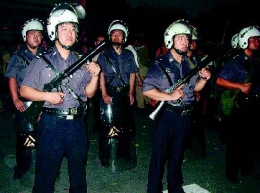At least 184 people have been reported dead and over 1,000 wounded after rioting broke out in the western Chinese province of Xinjiang between the Uyghurs, a Muslim ethnic minority, and the local Han majority.
And as is often the case with sectarian violence, these recent ethnics clashes seem to only have produced more questions than answers.
Reports indicate that violence broke out after Uyghurs took to the streets to peacefully protest what they view as their oppression by the Han majority. Rioting ensued as the Uyghurs clashed with Chinese riot police, who reportedly attempted to shut down the protest, eventually involving many Han Chinese.
According to Chinese Foreign Ministry spokesperson Qin Giang: “After the severely violent act involving beating, smashing, looting and arson erupted on 5 July in Xinjiang Autonomous Region, local authorities took decisive measures according to law.
“At present, the situation has been basically brought under control, and social order in Urumqi City is returning to normal.”
As a result of the violence, China’s President Hu Jintao opted to leave the G8 summit in Italy early.
Summy Wong, a Chinese woman who has lived in Ireland for many years, says such ethnic tensions are nothing new.
“To me, China has a large number of large minority tribes, and in this sort of recession, this type of reaction can happen between them,” she says. “Not only in China, but all over the world.”
The rioting appeared to have died down over the weekend. But confirming that the violence has ended, or even the number of people arrested, has not been easy for media outlets outside of China.
The country has been criticised for restricting journalistic access, most notably after the 2008 earthquake that rocked the Sichuan province, and during parts of the 2008 Summer Olympics in Beijing.
“One of the things that we are finding is that it’s hard to get information and confirmed reports out of China,” said Justin Moran, spokesperson for Amnesty International’s Irel-and section. “It doesn’t seem that journalists, especially foreign journalists, are getting all the access they would like.”
Amnesty International has called on the Chinese government to release a detailed accounting of all those who have been killed and detained in the wake of the riots, and has also demanded the release of any detainees who were arrested for peacefully exercising their right to protest.
“All people have a right to peaceful protest, and if violence was committed by protesters, then they deserve a fair and open trial,” said Moran.
The Chinese government has promised to seek punishment for any crimes that may have been committed during the riots, and has vowed to pursue the death penalty for any rioter who is convicted of committing an act of violence.
This declaration has raised the ire of human rights organisations, as Chinese officials have announced the arrest of over 1,000 people in connection with the riots.
“There seems to be some dispute over the number that have actually been detained, but either way, Amnesty International is opposed to the death penalty,” said Moran. “The death penalty is unacceptable,” said Moran.
China currently leads all other countries in total executions and number of death sentences handed down per year.












